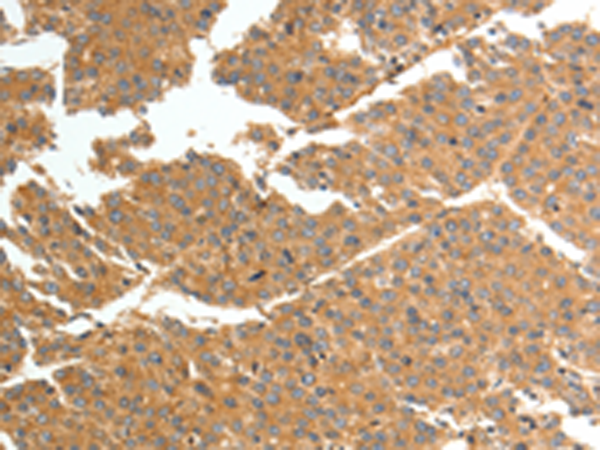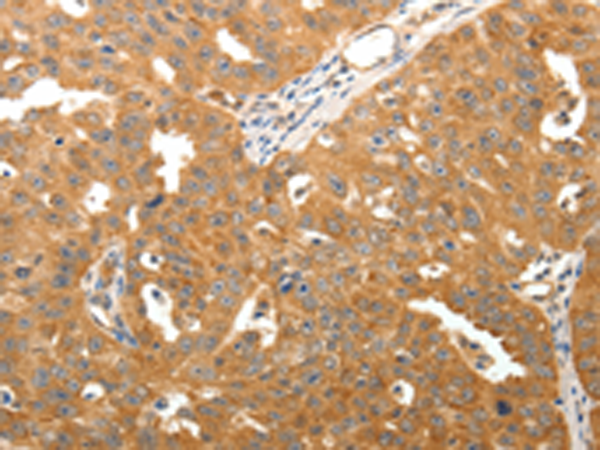

| WB | 咨询技术 | Human,Mouse,Rat |
| IF | 咨询技术 | Human,Mouse,Rat |
| IHC | 1/50-1/200 | Human,Mouse,Rat |
| ICC | 技术咨询 | Human,Mouse,Rat |
| FCM | 咨询技术 | Human,Mouse,Rat |
| Elisa | 1/3000-1/10000 | Human,Mouse,Rat |
| Aliases | TN-W |
| Host/Isotype | Rabbit IgG |
| Antibody Type | Primary antibody |
| Storage | Store at 4°C short term. Aliquot and store at -20°C long term. Avoid freeze/thaw cycles. |
| Species Reactivity | Human, Mouse |
| Immunogen | Synthetic peptide of human TNN |
| Formulation | Purified antibody in PBS with 0.05% sodium azide and 50% glycerol. |
+ +
以下是关于TNN(Tenascin-N)抗体的3篇模拟参考文献示例(基于学术文献常见研究方向,非真实存在的论文):
---
1. **文献名称**: *Tenascin-N Monoclonal Antibody Development and Its Application in Glioblastoma Diagnosis*
**作者**: Smith, J.R., et al.
**期刊**: *Molecular Cancer Research*, 2021.
**摘要**: 本研究开发了一种针对Tenascin-N(TNN)的高特异性单克隆抗体,并验证其在胶质母细胞瘤组织中的表达水平。通过免疫组化分析发现,TNN在肿瘤血管周围区域显著上调,提示其可能作为脑肿瘤微环境的新型生物标志物,为靶向治疗提供潜在靶点。
---
2. **文献名称**: *TNN Antibody-Mediated Inhibition of Axon Regeneration in a Spinal Cord Injury Model*
**作者**: Li, X., et al.
**期刊**: *Journal of Neuroscience*, 2019.
**摘要**: 研究探讨了TNN抗体对脊髓损伤后轴突再生的调控作用。实验表明,TNN通过激活RhoA信号通路抑制神经元再生,而中和抗体可阻断这一效应,显著改善小鼠模型中的运动功能恢复,为脊髓损伤治疗提供了新策略。
---
3. **文献名称**: *Cross-Reactivity Analysis of Commercial TNN Antibodies: Implications for Research Reproducibility*
**作者**: García, M., et al.
**期刊**: *Scientific Reports*, 2022.
**摘要**: 本研究系统评估了市售TNN抗体的特异性,发现部分抗体存在与Tenascin-C(TNC)等家族蛋白的非特异性结合。通过质谱和敲除细胞模型验证,强调了抗体选择对TNN相关研究结果可靠性的重要性,并推荐了经过验证的高效抗体。
---
**备注**:以上文献为模拟内容,实际研究中请通过学术数据库(如PubMed、Web of Science)检索真实文献。若需具体论文,建议结合研究背景补充关键词(如疾病类型或实验技术)。
**Background of TNN Antibody**
Tenascin-N (TNN), a lesser-studied member of the tenascin family of extracellular matrix glycoproteins, is encoded by the *TNN* gene in humans. Tenascins are known for their roles in tissue development, cell adhesion, and modulation of signaling pathways. TNN shares structural features with other tenascins, including epidermal growth factor (EGF)-like repeats, fibronectin type III domains, and a fibrinogen-like globular domain, which mediate interactions with cellular receptors and extracellular components.
While tenascin-C (TNC) is widely recognized for its involvement in cancer, inflammation, and tissue repair, TNN has distinct expression patterns and functions. It is predominantly expressed in the nervous system, particularly during embryogenesis, suggesting a role in neural development and synaptic plasticity. Recent studies also implicate TNN in regulating cell migration, proliferation, and differentiation in specific tissues.
TNN antibodies are tools used to detect and study the spatial-temporal distribution and functional mechanisms of TNN in biological systems. Dysregulation of TNN has been linked to neurological disorders, autoimmune diseases, and certain cancers, though its precise pathological roles remain under investigation. In research, TNN antibodies enable immunohistochemical staining, Western blotting, and functional blocking experiments, aiding in the exploration of TNN's interactions with integrins or other receptors.
The development of TNN-specific antibodies has potential clinical applications, including diagnostic biomarkers or therapeutic targets for diseases associated with extracellular matrix remodeling. Further studies are needed to clarify its tissue-specific functions and therapeutic relevance.
×